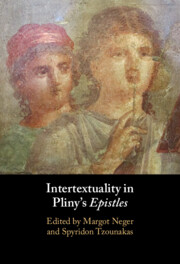Book contents
- Intertextuality in Pliny’s Epistles
- Intertextuality in Pliny’s Epistles
- Copyright page
- Contents
- Contributors
- Acknowledgements
- Abbreviations
- Introduction
- Part I Intertextuality and Interdiscursivity in Pliny’s Letters
- Part II Models and Anti-Models: Pliny’s Interaction with Oratory and Natural History
- Part III Pliny and Seneca: Discourses of Grief and Posthumous Reputation
- Part IV Pliny’s Villas and Their Poetic Models
- Part V Pliny Turns Nasty: Satire and the Scoptic Tradition
- Chapter 11 A Busy Day in Rome: Pliny, Epistles 1.9 Satirized by Horace, Satires 1.9
- Chapter 12 Putting Pallas out of Context: Pliny on the Roman Senate Voting Honours to a Freedman (Plin. Ep. 7.29 and 8.6)
- Chapter 13 Risus et indignatio: Scoptic Elements in Pliny’s Letters
- Part VI Final Thoughts: Discourses of Representation and Reproduction
- Bibliography
- General Subject Index
- Index Locorum
Chapter 11 - A Busy Day in Rome: Pliny, Epistles 1.9 Satirized by Horace, Satires 1.9
from Part V - Pliny Turns Nasty: Satire and the Scoptic Tradition
Published online by Cambridge University Press: 07 September 2023
- Intertextuality in Pliny’s Epistles
- Intertextuality in Pliny’s Epistles
- Copyright page
- Contents
- Contributors
- Acknowledgements
- Abbreviations
- Introduction
- Part I Intertextuality and Interdiscursivity in Pliny’s Letters
- Part II Models and Anti-Models: Pliny’s Interaction with Oratory and Natural History
- Part III Pliny and Seneca: Discourses of Grief and Posthumous Reputation
- Part IV Pliny’s Villas and Their Poetic Models
- Part V Pliny Turns Nasty: Satire and the Scoptic Tradition
- Chapter 11 A Busy Day in Rome: Pliny, Epistles 1.9 Satirized by Horace, Satires 1.9
- Chapter 12 Putting Pallas out of Context: Pliny on the Roman Senate Voting Honours to a Freedman (Plin. Ep. 7.29 and 8.6)
- Chapter 13 Risus et indignatio: Scoptic Elements in Pliny’s Letters
- Part VI Final Thoughts: Discourses of Representation and Reproduction
- Bibliography
- General Subject Index
- Index Locorum
Summary
While the satiric representation of city life and particularly Horace’s Satires have been already acknowledged as relevant contexts for Pliny’s Ep. 1.9, its Horatian ‘numerological parallel’, Sat. 1.9, has been left out of consideration so far. This chapter aims at filling in that gap and reading Pliny’s letter 1.9 against the background of Horace’s Sat. 1.9. As it shows, Pliny’s urban interactions go hand in hand with the generic interactions performed by his epistle: while the city forces Pliny to interact with various anonymous interlocutors (ille, ille, and ille) and thus disturbs his otium and undermines his personal autonomy, the Horatian intertext makes the epistle interact with the genre of satire which restricts its literary or generic autonomy. Due to the sinistri sermones (‘unkind insinuations’, and also ‘ominous satire’?, 1.9.5) so typical for the urbs, Pliny’s position gets dangerously close to the roles of both ‘Horace’ and the ‘Bore’ in Sat. 1.9, and his epistle starts to change into a kind of satiric representation of his life in Rome, where everybody is everybody’s ‘bore’. Pliny’s letter 1.9 is thus not only a laudatio of countryside otium, but also an intertextual tour de force that shows us the satirizing effects of urban interactions.
Keywords
- Type
- Chapter
- Information
- Intertextuality in Pliny's Epistles , pp. 219 - 240Publisher: Cambridge University PressPrint publication year: 2023

